President Jacqui? Inside the political rise and rise of Tasmanian Senator Jacqui Lambie
She blasted into federal parliament a decade ago and was quickly written off – but her passion and persistence has made her a force to be reckoned with. Where’s the limit for Jacqui Lambie?
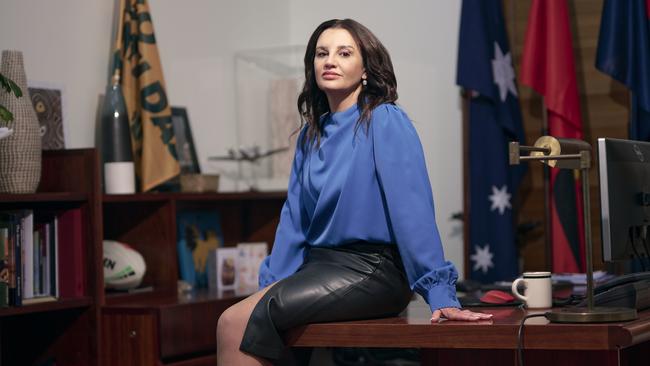
Jacqui Lambie, you might say, is spewing. The Tasmanian senator is seeping fury, hunched over, fist clenched, her enraged voice booming across multiple levels of Parliament House.
“I’m ropable,” she thunders as she strides to the edge of the Mural Hall, an airy location marketed as “convenient for parliamentarians and other VIPs, or to capture the interest of passers-by”, and which, on a scale of serenity to stress, has been listing heavily towards the former. Until a few moments ago, when Lambie called a press conference. And suddenly her fast and furious morning seems destined to reach its zenith.
Last night she informed the Senate of her planned amendment to Fair Work legislation allowing textile, clothing and footwear workers, many of them women from non-English speaking backgrounds who have experienced exploitation, to hold a silent vote on breaking away from the Construction, Forestry and Maritime Employees Union.
“I don’t want to hear any rubbish tomorrow,” she’d growled at her Senate colleagues of the next day’s vote, her tone more akin to a family dispute than an address to the nation’s legislative body. “I’m putting that amendment up and, God forbid, God forbid, after everything that’s gone on in the last three or four years up here, if you don’t stand up for these women – that goes for that side over there, the Government and the Greens … your credibility will go down the drain just like that tomorrow. So I am putting it to you. I’m coming for that amendment, and I want it supported.”
So yes, she’s arrived at work confident of cross-party support today. On the Lambie scale of injustice, there’s a simple logic. Helping these women, many of whom feel intimidated, just makes sense; who wouldn’t vote her way?
Plenty, as she learns at an early morning office gathering of her small staff, when an aide reveals that the Greens intend to vote no this afternoon. In the hours since, Lambie has been moderately infuriated. But she has also heeded her staffers’ advice that a round of calls might be most effective, for now, at attracting support.
Then, as she’s sitting quietly, and presumably quietly confident, in the Senate late morning, Lambie receives phone confirmation that the Greens will indeed vote against her amendment in a few hours. And so the eruption begins.
“Smash them!” she turns and hisses to an aide at the back of the chamber, her face folded in fury. Her voice is louder than a whisper, and her tone is searing. “I am so angry!” she spits out as she confronts Greens Senator Jordon Steele-John on his way to his seat moments later. “I’m going at it!”
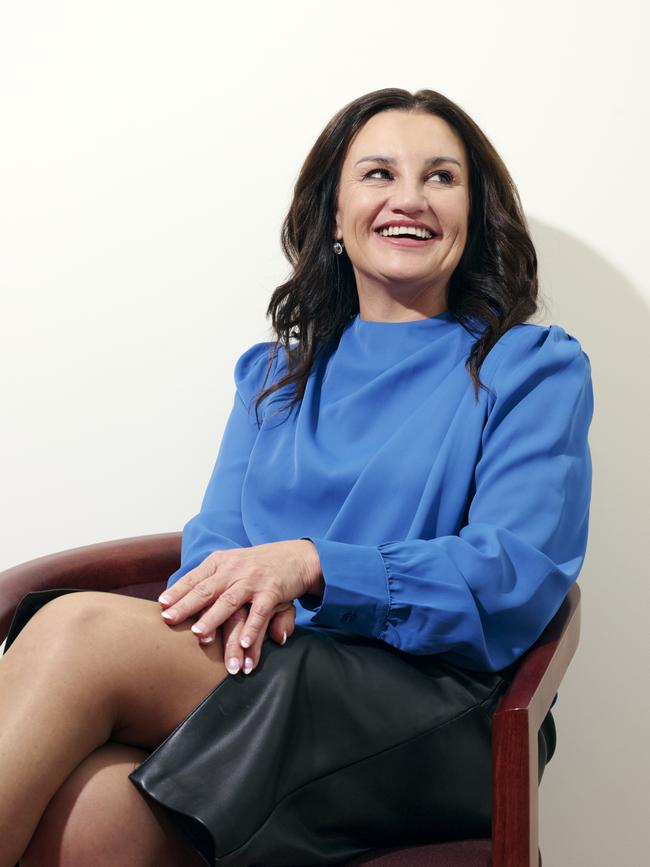
As promised, she’s fronting the media an hour later in the Mural Hall, a tinderbox of tension in comfortable heels, raining warnings at her colleagues via the nation’s cameras: “You have about two hours to get your crap together and do what’s the right thing … for women in this country.”
What follows is passionate, fierce, and so loud that for several electrifying minutes the nearby halls of the federation’s centre of democracy are filled with the sound of Lambie. It is also a real-life demonstration of one woman’s passion, the strength of her conviction and her belief in the power of one meeting the brutal reality of Australian politics.
No one really expected her to still be here. Not the politically disinterested teenager from working-class Devonport who dropped out of school, later describing her ascension to the Senate as a miracle. Not the unnamed Canberra heavyweights she suspects were looking down their noses when she finally assumed her seat in her forties, a straight-talking beacon in yellow. “I don’t know if they expected me to fail or if they thought that she’s just not capable of being in the Senate.”
And then Jacqui Lambie became a political stayer, or as she puts it, one of the “grandmothers” of federal parliament, engendering respect, even admiration in an unlikely political career in which second shots feature prominently. As she says: “If I lose a tussle I’ll withdraw, and I’ll wait and I’ll wait and I’ll go back in, and then the second time I’ll usually win.”
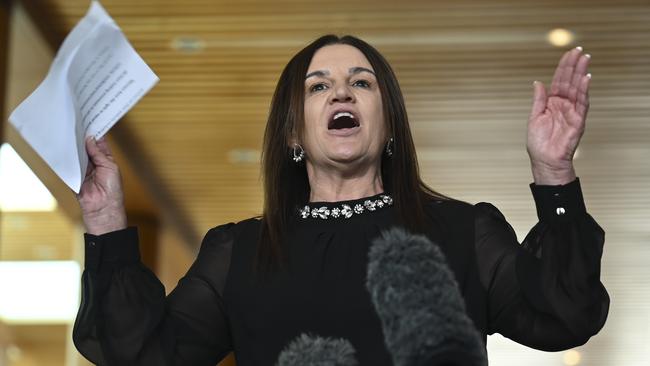
For her first act, she was rambunctious, loud, opinionated – a headline writer’s fantasy. Tony Abbott was a political psychopath. Vladimir Putin was a strong leader with great values. And let’s ban the burqa. Political longevity did not seem likely when she arrived in Canberra in 2014, on the back of just 1501 primary votes; she landed at federal parliament with plenty of life experience but little experience of life in the capital. A single mother of two, her decade in the military – she’d joined on the spur of the moment with two girlfriends who pulled out after Lambie had enlisted – was the second longest work-related stint of her then 43 years. She spent slightly longer fighting the Department of Veterans’ Affairs for compensation for the chronic back pain that ended her military life with a medical discharge.
In her maiden parliamentary speech in 2014, which she began by acknowledging her Aboriginal ancestry, revenge ranked high on Lambie’s list of political ambitions. “I intend to be part of the greatest reforms of Australia’s Department of Veterans’ Affairs and our Defence Force,” she declared as she referenced the injustices suffered by veterans and their families. In this place of national significance, her oration was at first halting, but it also carried the undertone of feisty determination for which she would become renowned.
“She was quite antagonistic initially, combative,” recalls former South Australian senator Nick Xenophon. From the outset Lambie was marked as a colourful newbie, but not so much for the luminous yellow clothing that marked her as one of the freshly elected MPs to billionaire Clive Palmer’s fledgling Palmer United Party. Abrasive, with a sometimes startling level of directness that she attributes to her military training (standouts from her maiden speech included “I am appalled and disgusted” and “this outrageous, stinking, filthy injustice”), she was bound to attract attention.
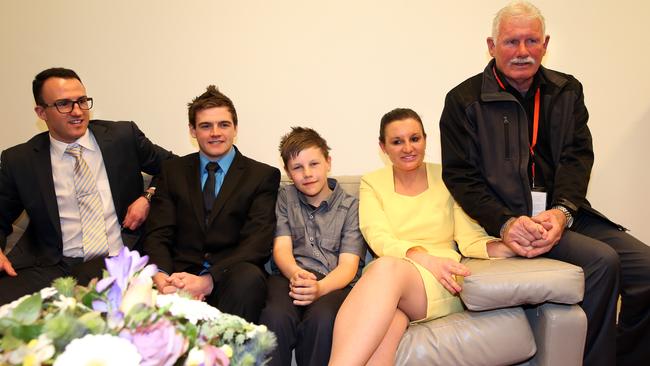
She was labelled “increasingly erratic”, a “loudmouth” and a “Hanson-esque battler” – sobriquets that were replaced within months with “rogue” as a split emerged with her party leader Clive Palmer over support for issues that Lambie considered would give “my Tasmania the best chance of recovering and once again becoming prosperous”.
By late 2014 she had quit the party. Suddenly she was an unencumbered agent. “I am now free,” she declared, “to negotiate with the Government and anyone else in this parliament in good faith, and with the best interests of Tasmanians”. Within months she had founded her Jacqui Lambie Network.
It was a rapid start to a political life, even as the legacy of her immediate past lingered. In 2009, after years of unsuccessfully battling the Department of Veterans’ Affairs, a distraught Lambie had thrown herself in front of a car, and she was not long out of a psychiatric clinic when she took up her Senate seat. As she says now: “I was just lost in the fog those first two years. I couldn’t tell you half the things [legislation] I put through.”
What she does remember is her shock at the nation’s parliament. “Just how dysfunctional it is and how long it takes to get anything done – if you were a business you would have been bankrupt by the first week,” she says from her simply decorated parliamentary office, one of 4500 rooms in the nation’s largest house. She speaks easily and rapidly, and can summon an opinion on seemingly anything – although there’s an extended pause when asked about the quality of MPs in Canberra; it’s clear she is not thrilled.
–
“I bring that down to the lack of experience of the politicians. They’re very lovely and they mean well but [they’re] shit [at] getting anything done.”
–
Or as she also says on a busy sitting day in which she squeezes in, among other things, two other interviews and a press conference: “With the ideas that are put across the chamber, I think they’re slightly detached from reality.”
Lambie, on the other hand, can “channel some of the frustrations that Australians feel with politics,” says Senator David Pocock, the former Australian rugby union player with whom she has developed a good working relationship. “And that was a big reason I put my hand up to be an independent. I was frustrated. There are solutions and instead we are seeing politicians politicise issues.”
That Lambie has lived through many of those issues experienced by her fellow citizens is key to her changing political fortunes. She knows exactly what it is to be a single parent, to worry about affording food for her children, to be out of work, in the military, battling a government department, facing depression, loving a child addicted to ice, living with chronic pain, becoming hooked on painkillers.
Yes, her parliamentary start was stilted. “I was such a wrecking ball in those first few years. I probably didn’t have the right adviser,” she says now. (Her former chief of staff Rob Messenger, with whom she fell out seven years ago, and his wife Fern, Lambie’s former office manager, lost a protracted legal battle over their 2017 dismissal from the senator’s office.) But as an independent, increasingly following her own instincts rather than an adviser’s, and building relationships with a range of politicians, she had enough support to be re-elected to the Senate in 2016.
Only to have to walk away in 2017, when she discovered that her grandfather had not renounced his British citizenship. That meant Lambie was deemed to be a dual citizen and ineligible to take her place in the nation’s parliament. On a tearful day in November that year, she resigned from parliament. By then she was having panic attacks and was struggling with the media attention. Yet the response from colleagues, as she farewelled the Senate and a possible end to her public life, said much about the standing she had amassed over the previous three years, when her negotiations with a range of parties on a host of issues exposed her to ever more corners of the populace, with all their experiences and opinions.

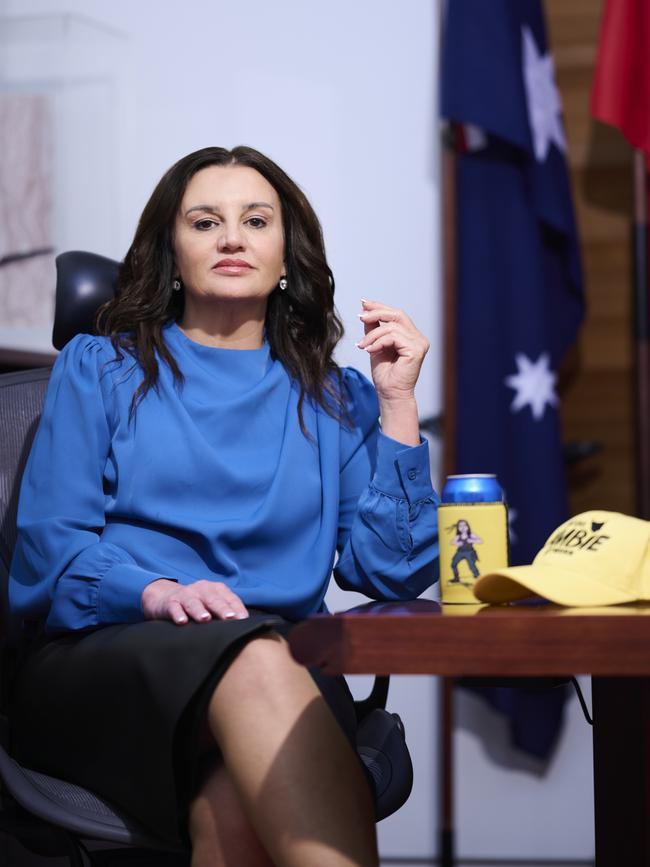
Labor’s Pat Dodson cried. Greens senator Andrew Bartlett lauded Lambie’s integrity, passion and influence across the political spectrum. Liberal Attorney-General George Brandis was even more effusive. “It will be obvious to you, Senator Lambie, from these spontaneous expressions of affection, and, may I say, love that has come from all sides of this chamber, the effect that you have had upon all of the colleagues who have served with you … We have all benefited from your company, your wisdom, your life experience and, in particular, from your passion,” said Brandis, whom Lambie had reportedly once labelled a disgrace. “You have become one of the best-known and one of the best-liked people in this country since you joined the Senate, and the Senate is a better place, a much richer place, for you having served among us.”
Personally devastated but showered with collegial love, the woman least likely exited Canberra quite differently to her arrival.
The toll was deeply personal, and not just for the newly departed senator. “When I lost my seat I reckon within 24 hours my Dad was 10 years older,” Lambie says. “Because he’d seen what I had been through; he was there when I woke up in hospital after I’d walked in front of a car. And losing it [the senate spot] just blew him.” But Tom Lambie, a retired truck driver who died in 2022, was as dogged as his daughter, and within days was cajoling her to wrangle her political future. “He said, ‘We’re Lambies. We’re just going to get that seat back.’ And I said, ‘I don’t know I can do this anymore.’”
At 46, Lambie was again financially strained. Having previously been out of work for close to a decade because of her back injury, the three years’ salary she’d earned as an MP provided only a limited buffer. She wrote an autobiography, Rebel with a Cause (subtitled You Can’t Keep a Bloody Lambie Down – My Story From Soldier to Senator And Beyond), and took part in two reality TV shows, one of which plonked her into the African jungle with a field of celebrities, the other transporting her to deepest Syria for an up-close view of war and its refugee victims.

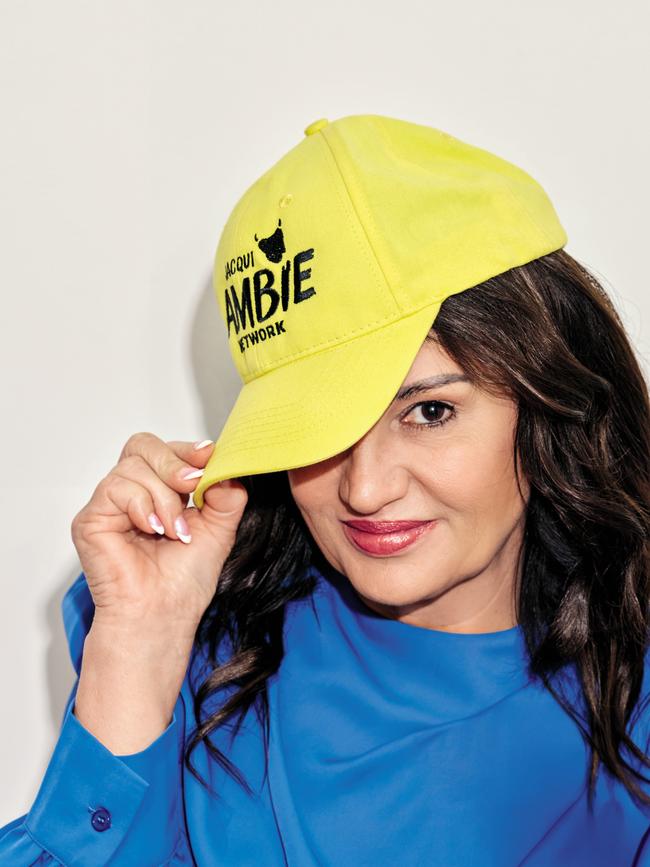
But when she decided to resurrect her political career, she still had so little money that she had to borrow a friend’s van for campaigning. She stuck a sign on the outside panel, and, with minimal funds, started spruiking herself again. “And I was able to live through that time. I got through. Just.”
Her second act began in 2019 when she won back her Senate spot. Today she describes her political position as “centre left on those that are less fortunate and doing it hard in their life. When it comes to national security, centre right. And a realist”.
In retrospect, those 20 months away from Canberra were invigorating. “It made me a better politician. I had some breathing space. And having to go back out and earn again, it made me bigger and stronger.” She returned to parliament “more self confident, more believing in myself, that I did belong here – I didn’t care that I came from public housing anymore … I had a right to be here.”
She still carried a degree of other-ness; in that year’s federal poll she was one of just four elected MPs who had not finished high school. But she has become increasingly relatable, polling second most popular federal politician in a recent survey.
“You know when you see people on TV and then you meet them in person and you think, ‘Wow, this person is not their TV persona?’ But with Jacqui, that’s her,” says Pocock. “And I think it’s really refreshing and so good for Australian politics to have people in there like Jacqui who tell it straight.”
“She’s exciting. She’s frustrating,” says Lambie’s former office manager Tammy Tyrrell, who was elected in 2022 as the second Jacqui Lambie Network senator. “Everybody in the Senate knows how passionate Jacqui is, especially when it comes to veterans issues. And yeah, they think she can be a bit loud and a bit of a pit bull at times … She always calls a spade a spade. And she gets street cred for that. But other senators respect her and they respect how far she’s come in her time in the Senate.”
At 53, Lambie is the unshackled politician open to taking on anyone and anything, from One Nation’s 2021 bill to end Covid vaccine mandates (“Being held accountable for your own actions isn’t called discrimination. It’s called being, you wouldn’t believe it, a goddamn bloody adult”) to union leaders. She can command the attention of 10,000 people at a Sydney rally when she declares that “the only good terrorist is a dead terrorist”, and she feels comfortable describing the crowd booing Prime Minister Anthony Albanese at the Australian Open tennis final as “a heap of rich people … they’ve had a bit of their tax taken off them to pay it forward, to give to those who are less fortunate. For God’s sake!” Today, though, she is less likely to be mocked as a result.
The difference a decade after she arrived in Canberra is pronounced. Back in Tasmania, the Jacqui Lambie Network is tipped to garner as many as one in ten votes at the state election later this month, and its founder has become synonymous with her home state – “If you’re doing focus groups in Tasmania it doesn’t matter what you’re talking about, she’s Jacqui-from-Tassie,” says social researcher Dr Rebecca Huntley. But Lambie’s voice is resonating beyond the state. As Nick Xenophon says: “She might be riffing for Tasmania but it’s music to the ears of many people on the mainland.”
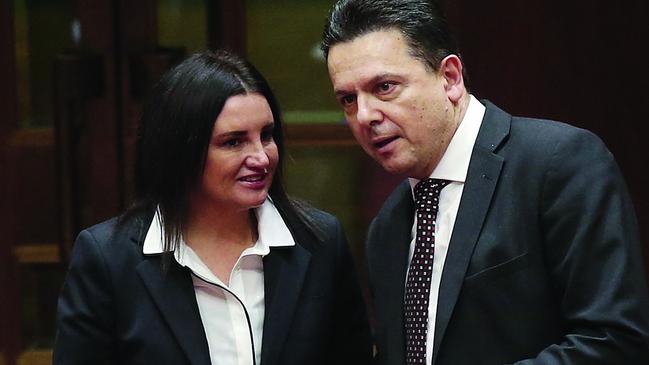
An ability to listen and to learn, skills that require “humility and recognising that you don’t know stuff”, have helped, says Huntley. So have impassioned pleas, say, that university – a place that Lambie had long considered to be for others – should be open to even the poorest kids. “It’s not an act of marketing … it’s an act of maturity in a place that can often be immature,” says Huntley. “In some ways people have largely forgotten she’s come from a Clive Palmer background.”
These days Lambie is her own brand. Given her fierce resistance to accepting donations from big business, she’s turned to some own-brand promotion to increase her team’s coffers, which, she says, currently amounts to $250,000 in the bank, $150,000 of that from votes won at the last federal election. Otherwise her network mostly relies on small donations.
“I think we once got a $5000 donation from a lovely academic in Queensland,” she reveals proudly, “and I got a cheque for $1000 a few weeks ago. Our average donation is just over $30.” She’s also launched an online store, “to avoid the big boys and their big donations. They want to influence my vote. Not bloody likely,” she declares on the site. It stocks, among other things, stubby holders featuring illustrated characters GI Jacqui and Jacqui Rambo, “I’ve had a gutful” T-shirts and hoodies, and “Be a goddamn bloody adult” mugs.
Lambie’s frankness, and the truthfulness with which she prides herself, have helped reshape her public image. Her speech is distinctive and brash. (Revealing that some Tasmanians admire her for improving with age, she says that they compare her to a lovely bottle of pinot noir, which she pronounces “noo-warrr”.) But it has also become a cherished asset. “In my early days I had someone going, ‘You should go to a speech therapist’, and I didn’t have self-esteem; I had been in and out of work.” She’s glad now that she resisted. “It’s who I am. You can like how I speak [or not] but I’m not going to change.” She has, she says, “tidied up over time”, conscious now not to offend individuals, particularly after receiving a good deal of hate mail. And that makes me look at myself. I’m my biggest critic.” And she pauses for only a second time. “Beside my mother.”
Not everything has changed. “This is f..king disgusting,” Lambie fumes as she strides from parliamentary corridor to corridor, into a lift and out towards the Mural Hall where a gaggle of cameras and reporters are waiting. Having checked her already straightened hair, she’s ditched her comfortable office sandals for a modest heeled pump, the highest pair her chronically painful back will allow her to wear, and of a style she considers befitting of a senator. “I’m not running around Tasmania in Armani; I’m out there with me jeans and boots on. On the other hand, up here [Canberra] they would expect that I’m dressing properly.”
In her pencil skirt and diamante-necked shirt, she strides up to the microphones and begins to speak off the cuff, warming up in a millisecond. Her fury crosses political lines as she describes the likely no vote for her amendment as “one of the lowest acts I’ve seen yet”.
The more she speaks, the more enraged she becomes, and after berating the Greens as hypocrites on white horses her focus shifts to the Government. “Where is Katy Gallagher? Where are you?” she bellows as she calls out the Minister for Women. “You don’t want these women to have lives! … You are shameful! Absolutely shameful!” As her rage escalates, so does her language. “It’s just disgusting” becomes “it’s bloody disgusting” and then “it’s f..king disgusting”. She yells, she gesticulates, she swears and threatens. “Don’t you stand up and talk about women’s rights in that chamber,” she roars to her colleagues via the cameras. “Because as of today, in my eyes your credibility has gone down the gurgler.”
Her face is furrowed and she’s hunched like a bull ready to charge. Then, as one of her staffers predicts, her voice breaks and her growl becomes a roar. “I’m going to call you out,” she bellows through the lenses to her opponents, her tone a mix of anger and derision. “You have about two hours so these women can be empowered.”

Press conference over, she charges off to the lift, the air in her wake thick with shock and awe. If this was a cartoon, there would be clouds of dust and bubbles of deliberately misspelt swear words – in capital letters – swirling in her wake.
“She’s like a turbocharged Tesla,” says Xenophon. “She can go from zero to 100 in three seconds and then slam the brakes and then coast for a while … but still get to her destination.”
The route, however, is not always direct, as Lambie discovers later in the day when the Government and the Greens vote against the amendment. Her grand plan is narrowly defeated 30 votes to 31.
Lambie, however, is also relentless. Almost immediately she decides to introduce a private senator’s bill. To be voted on later in the year, it will be free of the omnibus of other amendments that had to be voted on today, hopefully enabling more senators to support her plan in its own right. One more second go.
“I get really pissy when people haven’t been treated properly,” she says later in this long day. “I sometimes wish I was in my early forties because if I could have another 10 years … I’d be able to make even more change.”
And if she’s granted another decade in the red room? “I’d love to be that party in the centre that doesn’t rely on those political donations,” she says, “that can get people up with some common sense, where there’s no outside interference and where they’re only doing what’s best for the country. That’ll take me up to when I’m about 60. No idea then. Maybe we’ll get a republic up and I’ll be the first president.”





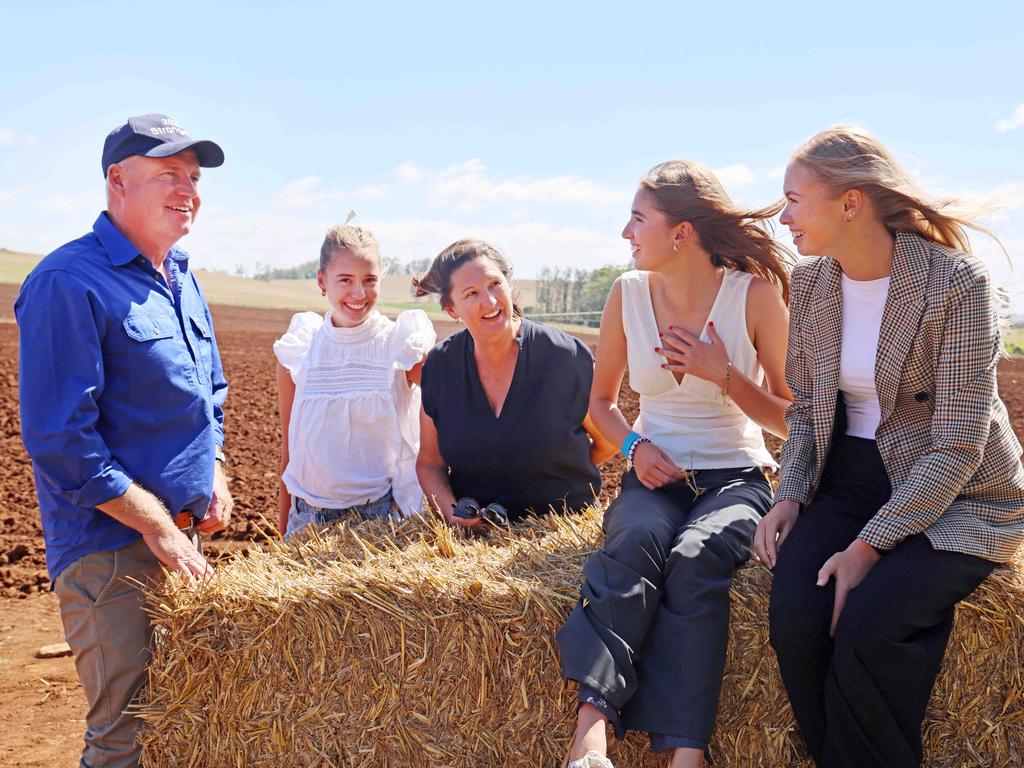
To join the conversation, please log in. Don't have an account? Register
Join the conversation, you are commenting as Logout